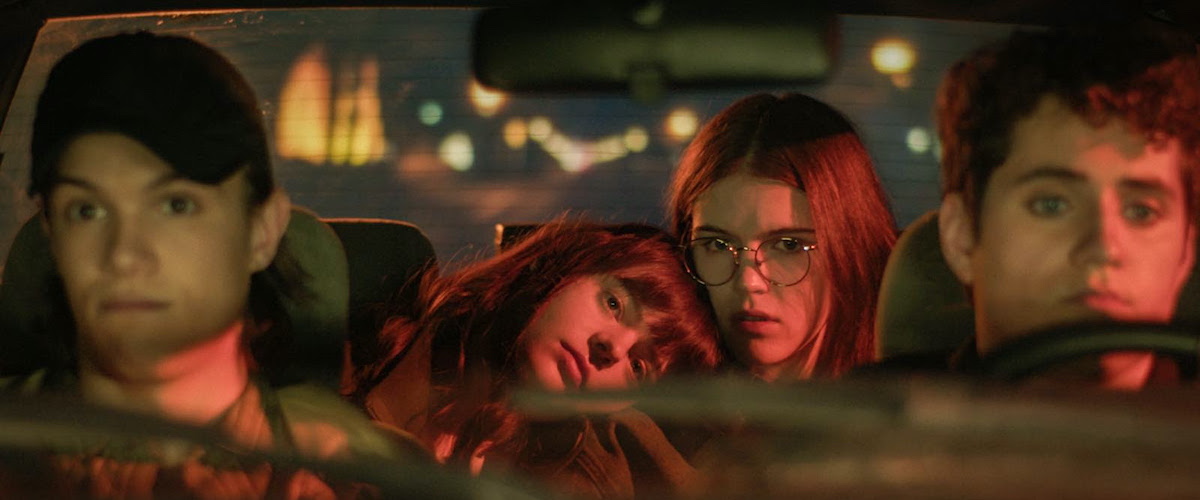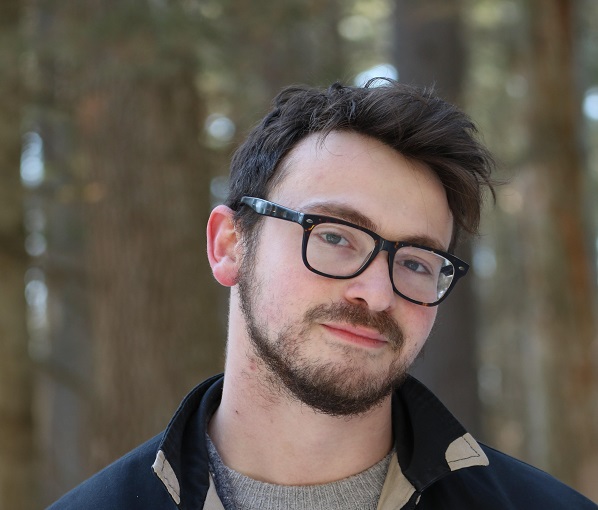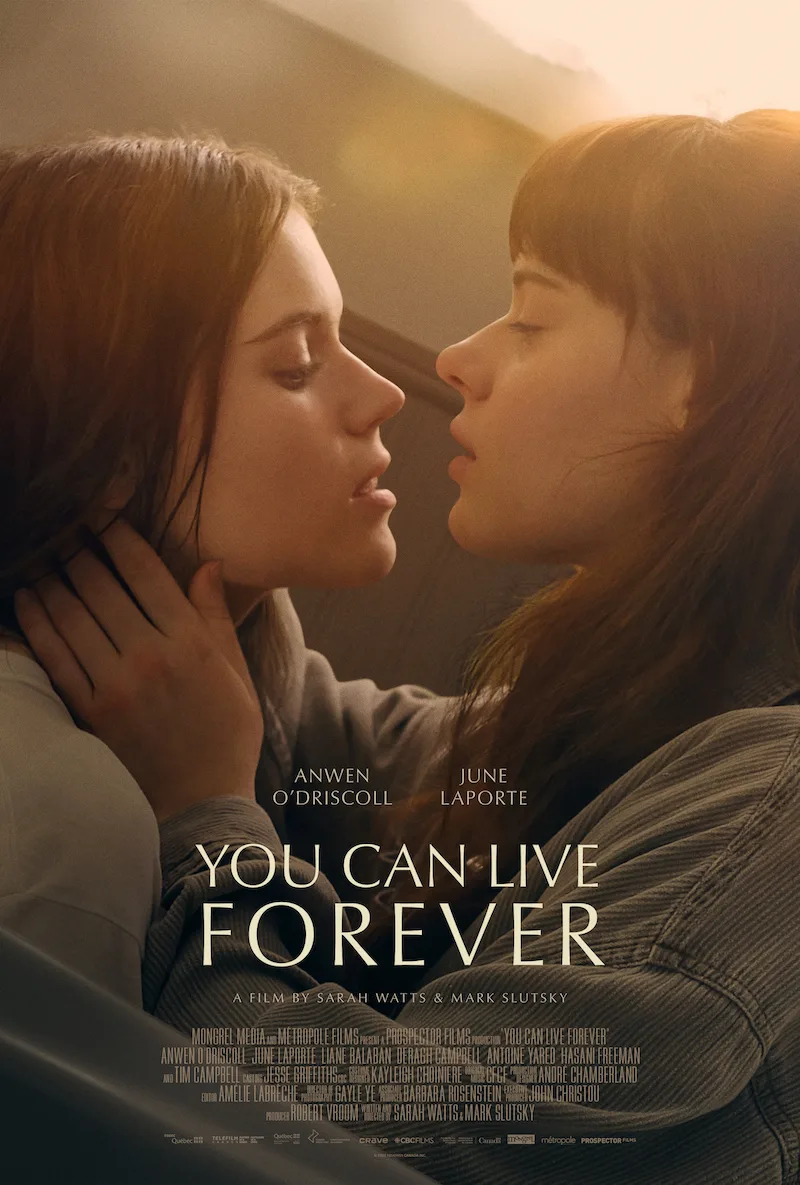After her father dies, teenager Jaime (Anwen O’Driscoll) is sent to the scenic Canadian seaside, where she’s to live with her aunt (Liane Balaban) and uncle (Antoine Yared) in a tight-knit Jehovah’s Witness community. As a non-believer and a lesbian, Jaime feels isolated in more ways than one, even before her relatives pressure her into attending religious services.
But it’s there, at a church meeting, that Jaime meets Marike (June Laporte), the minister’s daughter, whose bright smile and carefree demeanor put her at ease and stir up other, more complicated emotions. Soon, the two are at Marike’s house for dinner, then sleeping in her bed. Before long, they’re inseparable. But even as Jaime and Marike study the Bible and go door-to-door with brochures, their mutual attraction grows until it’s undeniable.
A tender and compassionate debut feature by writer/directors Mark Slutsky and Sarah Watts, the latter of whom grew up gay in a Jehovah’s Witness community, “You Can Live Forever” lets the romantic tension between its protagonists build slowly and naturally, in stolen glances and small touches. As Jaime and Marike circle each other, at once exhilarated and agonized by one another’s company, this ’90s-set film lingers in the uncertainty of first love and in the nervous wonder of queer yearning.
Slutsky and Watts are equally interested in what happens after Marike one night follows a prayer with a passionate kiss, and once she and Jaime embark on a forbidden affair behind closed doors (or inside movie-theater bathroom stalls, as it were). That community elders would stop the relationship is understood from the outset. Even Marike’s suspicious older sister (Deragh Campbell) must be avoided. But “You Can Live Forever” finds its most potent distillation of the conflict between love and faith in Marike herself, who fervently believes, like the other Witnesses, that Armageddon is imminent and, unlike the other Witnesses, that the long-promised “new system of things” will allow her and Jaime to be together, forever. And if Jaime doesn’t share her beliefs? Then, Marike answers, “I can believe enough for the both of us.”
Contemplating devotion, whether to a person or a higher power, as a form of endurance born of blind faith, “You Can Live Forever” takes care not to criticize its characters for their honest convictions. It’s empathetic even in how it treats the community’s authority figures, who are polite and occasionally unkind but always act from a place of faith. This approach, in turn, sharpens the film’s real critiques: of closed-mindedness, of cultures of fear and isolation, and of the danger that indoctrination poses to young people still developing their senses of self.
Few films have been made about Jehovah’s Witnesses; even fewer have engaged seriously with the strict insularity of their belief system, though that’s started to change in recent years. Dea Kulumbegashvili’s “Beginning” and Daniel Kokotajlo’s “Apostasy” explored the consequences of patriarchal submission for women in the faith. Richard Eyre’s “The Children Act” critiqued its religious opposition to blood transfusions. In its understated, unassuming way, “You Can Live Forever” offers a highly nuanced depiction of the sect’s membership, sympathizing with those born into the religion, accepting those who’ve embraced it as adults, and implicating its cloistered, authoritarian stricture all the same.
For Marike, who struggles to resolve what is irreconcilable in her sexuality and faith, self-denial has ultimately devastating consequences. Laporte does justice to Marike’s questioning, to the cognitive dissonance that her relationship with Jaime illuminates, without diminishing the sincerity of her belief; it is a heartbreaking performance, precise and transparent in its depiction of spiritual pressure and emotional process. O’Driscoll, meanwhile, is too skillful and sensitive an actor to define Jaime by the ’90s signifiers she’s afforded (her Siouxsie and the Banshees t-shirt, a Walkman equipped with Cocteau Twins), instead finding subtle ways to surface the character’s frustration and depth of feeling.
But it’s the chemistry that these two actors unlock—as steady, effortless, and compelling as the film itself—that most enriches their characters. As young people caught between doctrine and desire, Jaime and Marike realize that living “in the truth,” as the Witnesses refer to it, would mean denying their own. And the intimate heat between them, particularly during a memorable scene of a bathtub baptism, makes that next to impossible; O’Driscoll and Laporte bring to their characters’ dynamic the giddy glow of discovery. We come to believe in their love, to care about them as people.
Much of the film’s impact comes down to its script, by Slutsky and Watts, which rings true to its characters and mostly avoids cliché regarding the emotional experiences it depicts. Adding to the aura of authenticity is cinematographer Gayle Ye, who gradually moves from muted hues to brighter ones without breaking from the film’s naturalistic palette, and electronic composer CFCF, whose ‘90s-influenced score balances stargazing synth arpeggios with grand, Listszian piano chords for a trance-like atmosphere that amplifies the film’s mood of quiet loss and romantic longing.
Shot northeast of Montreal, in the Saguenay River valley, “You Can Live Forever” limits its use of the area’s natural beauty to a few scenes, which are more awe-inspiring for it. In one, filmed from above and far away, Jaime and Marike are seen as silhouettes wandering a beach at low tide, its sudden expanse at their feet. As sunlight sets, the sand shimmering, they appear to be walking on water. It’s a sublime moment in a film that gracefully depicts the love between its young characters as both real and revelatory—as a paradise on Earth for them alone to share.
Now playing in theaters and available on demand.




















